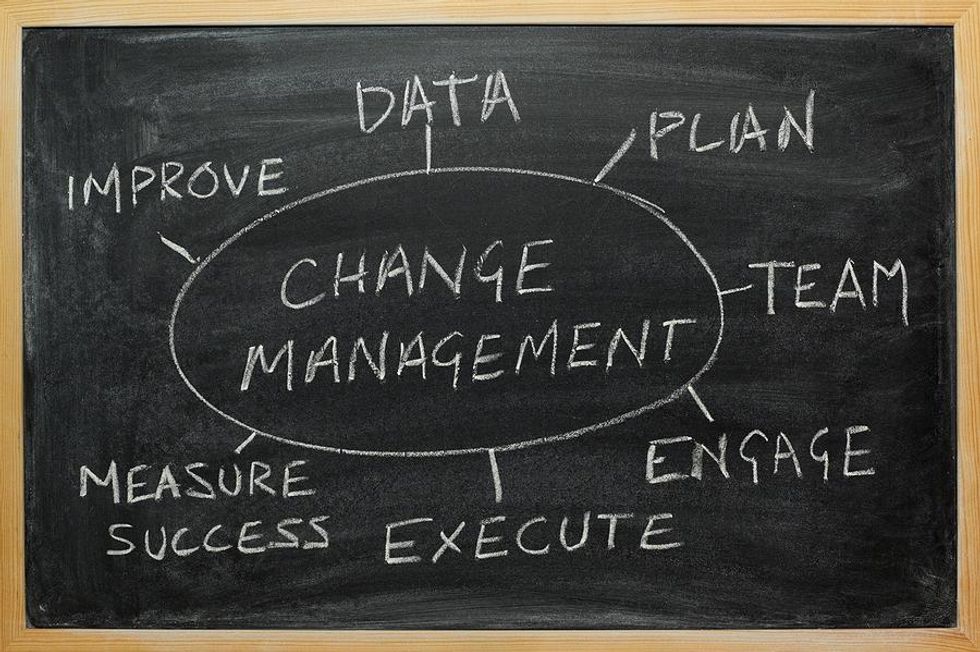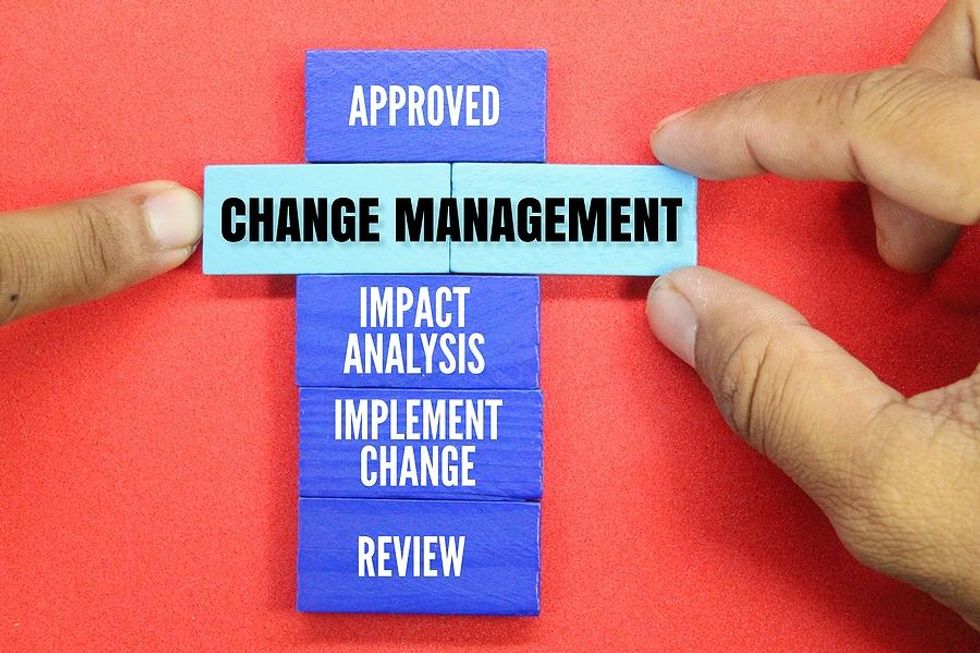Change Management vs. Management Of Change: Test Your Knowledge

Are you really managing change, transforming your organization, or following a project management process? Project management skills are very effective in all instances.
Change Management As A Transformation Agent

Bigstock
Throughout my career, I have been a part of several change management initiatives (or projects) whereby companies have made a conscious effort to implement specific strategic plans which had some impact on the organization.
In some instances, the changes were well defined, and the intent was clear; however, the problem was in the implementation and, most importantly, the sustainability of the change.
In other instances, the companies chose not to implement structural changes but chose to focus on improving existing processes in an effort to improve operational performance. The issues here were recognizing and again implementing the desired changes.
For example, one of the companies decided to implement a new work-from-home policy across their global locations. The initial idea was to apply the policy in a uniform manner across locations; however, this soon turned out to be inviable due to major differences in labor laws, the unionized segment of the workforce, and the availability of dependable, high-speed internet connections, just to name a few.
The change project turned out to be a massive endeavor with a significant degree of customization. It also took far much longer to implement, not only for cultural reasons but also for intergenerational reasons as the baby boomers and Gen X tended to prefer as much in‐person work as possible.
The change identified was a specific change to the HR policy yet, due to the nature of the change, it was actually a complete organizational transformation.
In today's increasingly unstable world, change management has been elevated with many companies assigning specific change management or organizational transformation teams to tackle many issues such as:
- Social inequality/inclusion
- Climate change; geopolitical instability
- Technologies (AI)
- Intergenerational and intercultural factors, work‐life balance
Whatever the case may be, change is the new normal and successful companies must have a clear, forward‐looking strategy for long‐term survival.
Managing Change Initiatives As Projects

Bigstock
When implementing change initiatives, there are many moving parts that need to be managed, considered, and accepted. This also entails a full understanding of the business context of the desired change, the people that will need to adopt the change, as well as the economic impact of the change.
If it sounds familiar, these elements align closely with scope, stakeholder management, and cost control which are three of the knowledge areas of the project management profession.
This is why I believe that change management initiatives be:
- Considered as a project
- Managed by a project team (dedicated when possible)
- Supported by top stakeholders
In this way, the main areas that will affect the success of the implementation will be managed by a team that already uses these skills in their daily work: scope, risk, cost control, communications, quality, procurement, etc.
In today's climate, I cannot stress enough the importance of managing THE most important corporate resource: the PEOPLE!
Successful implementations are mindful of:
- Employee satisfaction/risk of turnover (brain drain)
- Maintaining business continuity
- Protecting corporate image
- Sustainability of the change
Just because the project crossed the "Go Live" stage does not mean the change is fully implemented! Sometimes the training, acceptance, and desired productivity can take years to fully achieve across the organization so ensure a sustainability team remains "on call" for as long as it takes.
This is why it is super important to determine if the rollout will be top‐down or bottom‐up (communications and stakeholder management!).
Change initiatives can really be highly successful when you really manage all of these moving parts!
Management Of Change (MOC) Is Not Change Management

Bigstock
Recently, I worked with a company that frequently used the term “managing a change" to apply to virtually any change that they encountered on a daily basis. I heard the term applied when an operational issue did not go according to plan, when an employee did not follow a specific safety procedure, and when the finance department moved a specific cost to a new account on the ledger.
While one could argue that having to process such situations would be a sort of management of change, the term itself is actually a project management concept that applies to variances between budgeted or baseline tasks versus modifications that are proposed either by internal departments external customers and third parties.
Lack of compliance with company procedures is not management of change; it is definitely something to be investigated and should be part of an employee's performance evaluation.
So, what is management of change then?
In the energy sector, equipment suppliers manufacture products such as valves, pipes, fittings, or other industrial items that are subject to customer inspection. During the bid phase, the scope of the inspection activities will be set and agreed upon prior to contract signature. After contract signature, if the customer decides to change the inspection criteria by requiring more rigid specifications be followed, or even the ability to stop manufacturing activities in-process when this was not agreed, then this would constitute a management of change (MOC) event.
MOCs are every project manager's nightmare or OPPORTUNITY!
Management of change is one of those tricky, disruptive subjects that requires:
- A solid work breakdown structure (WBS) and detailed schedule
- A level-headed strategy
- Incorporation of the project risks
- Alignment with sales and the key stakeholders
Some would say that it is its own knowledge area...
Whatever the case may be, following a robust MOC process will greatly increase the project's chances of success, including a better bottom line.
Is This Change Management Or Management Of Change?

Bigstock
When demystifying the change management vs. management of change conundrum, we can ask ourselves a number of questions to determine not only which one applies, but also how to manage each.
- What is the nature of the change? It is a process, an initiative, project‐related scope element?
- Why the change? Is it philosophical, economically driven, a regulatory requirement?
- When does the change need to be implemented?
- Who will be affected by the change?
- Where will the change be executed? Across departments, divisions, locations, etc.?
- How will the change be managed? Top‐down, bottom‐up, inside‐out, outside‐in?
Although many of these questions seem quite obvious, you would be surprised by the number of companies that do not actually ask these specific questions.
As a general rule, I have found that these questions and the ensuing actions are best covered by issuing a formal project charter whereby the main stakeholders apply their individual signatures as a show of commitment but also to demonstrate full understanding of the change project.
Upon approval of the project charter, key results and objectives (OKRs) or KPIs are formally issued and, once again, signed off by the same stakeholders that validated the project charter.
The project execution plan is then issued with the corresponding tasks to be completed with the agreed baseline dates established in the charter. Any deviation to these tasks would then generate a management of change or MOC event, in classic project management terms.
For short-term or small scope changes, these tools can be scaled or even reduced to checklists so that an agile mindset prevails, thus avoiding a heavy, bureaucratic process that will not be well received.
Project management and change management, therefore, are intrinsically linked but use different strategies and techniques to achieve their goals. Using project teams to manage both is a very effective way to increase the organization's chances of success.
- 6 Reasons Why You Need To Have A Project Kickoff Meeting - Work ... ›
- 5 Project Hacks To Make You Stand Out With Top Management ... ›
- How I Used Project Management To Excel In Life - Work It Daily ›
- 8 Things You Need To Know About Project Management - Work It ... ›
- Program Management vs. Project Management: Key Differences - Work It Daily ›
- Mastering The Art Of Stakeholder Management - Work It Daily ›
- How To Manage Change In An Organization - Work It Daily ›

 Bigstock
Bigstock Bigstock
Bigstock Bigstock
Bigstock


